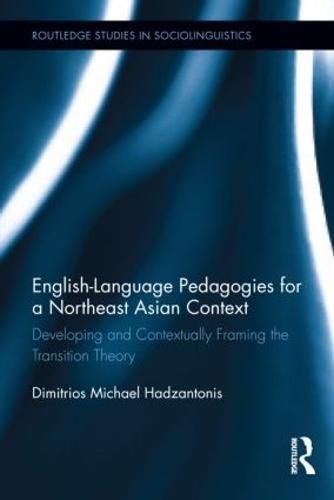Overview
This book investigates, from a sociocultural, linguistic, and pedagogical perspective, the conceptual and pragmatic frameworks that characterize secondary language learning in a Northeast Asian context. Hadzantonis contextualizes these salient domains through an engagement with social and cultural themes such as the familial, political, as well as cultural commodities and socioeducational structures. In this way, the text employs tools such as transnational theory and performativity and develops a model that contributes to the resolution of one of the greatest economic issues of the time, that of ineffective secondary language learning.
Full Product Details
Author: Michael Hadzantonis ,
Dimitrios Michael Hadzantonis (RMIT University, Australia and Sungshin University, South Korea)
Publisher: Taylor & Francis Ltd
Imprint: Routledge
Dimensions:
Width: 15.20cm
, Height: 2.40cm
, Length: 22.90cm
Weight: 0.910kg
ISBN: 9780415806909
ISBN 10: 0415806909
Pages: 392
Publication Date: 19 December 2012
Audience:
College/higher education
,
Postgraduate, Research & Scholarly
,
Undergraduate
Format: Hardback
Publisher's Status: Active
Availability: In Print

This item will be ordered in for you from one of our suppliers. Upon receipt, we will promptly dispatch it out to you. For in store availability, please contact us.
Reviews
<p> This new transition model of language pedagogy impresses upon the reader the necessity of new perspectives in language education, as it accounts for culturally specific learning styles and learner social, political and cultural identities that previous work has not. It presents EFL/expanding circle learners as having agency through uniquely cultured learning styles, styles that educational stakeholders must accommodate when promulgating language pedagogies. - Katherine Chen, University of Hong Kong
This new transition model of language pedagogy impresses upon the reader the necessity of new perspectives in language education, as it accounts for culturally specific learning styles and learner social, political and cultural identities that previous work has not. It presents EFL/expanding circle learners as having agency through uniquely cultured learning styles, styles that educational stakeholders must accommodate when promulgating language pedagogies. - Katherine Chen, University of Hong Kong
<p> This new transition model of language pedagogy impresses upon the reader the necessity of new perspectives in language education, as it accounts for culturally specific learning styles and learner social, political and cultural identities that previous work has not. It presents EFL/expanding circle learners as having agency through uniquely cultured learning styles, styles that educational stakeholders must accommodate when promulgating language pedagogies. <p>--Katherine Chen, The University of Hong Kong
Author Information
Michael Hadzantonis develops discourses in sociology, social anthropology, and related linguistics, and has worked in global academic contexts for approximately two decades.




